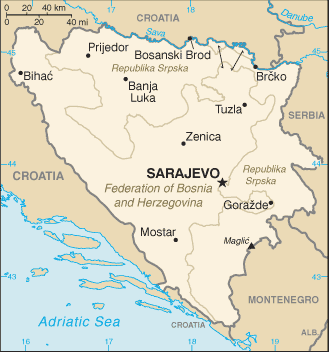Airspace: 19,767 square miles
Recent Airspace Conflicts
The war in Bosnia and Herzegovina, one of several violent conflicts in the territory of the former Yugoslavia, was an armed conflict that took place between March 1992 and November 1995. The war involved several ethnically defined factions within Bosnia and Herzegovina, each of which claimed to represent one of the country’s distinctive peoples: Bosniaks, Croats, and Serbs.
On April 12, 1993, the North American Treaty Organization (NATO) initiated “Operation Deny Flight” which was requested by the Security Council of the United Nations in response to the war in Bosnia and Herzegovina. The operation was meant to enforce a No-Fly Zone over Bosnia, but was extended with close air support operations in order to defend UN forces on the ground, and to deter Serbian aggression against six UN-designated Safe Areas. The No-Fly Zone lasted until December of 1995, during which time the UN documented more than 5,000 cases when this zone was breached.
Despite these breaches, this operation is considered to have created a tangible international presence in the region, and the No-Fly Zone is viewed as a key component leading up to the Dayton Peace agreement signed on December 14, 1995, which put an end to the three and a half year long war in Bosnia.
In 1997, after the conflict, Bosnian states entered into an agreement that decreased the level of their airspace under the control of the NATO-led Stabilization Force. Serbia and Croatia, due to their air traffic control capacity, were granted domain over their airspace in the upper level in this same agreement. The revenue Serbia and Croatia gained from their aviation services has motivated Bosnia to reclaim its own airspace. While some Bosnian airspace remains in the hands of peacekeepers (now the European Union Force), Bosnia plans to take full control of its upper airspace in 2008, 13 years after the war.
Airspace Regulatory Body
European Union Force (EUFOR): An international military force under the supervision of the European Council, EUFOR has partial control over the airspace of Bosnia. The Dayton Agreement gives EUFOR the right to “unimpeded freedom of movement, control over airspace, and status of forces protection.”
Bosnia and Herzegovina Directorate of Civil Aviation (BHDCA): Established within the Ministry of Communication and Transport, BHDCA is working to assume more responsibility for its airspace, reaching an agreement with EUFOR in 2006 that provides for partial Bosnian management of its upper airspace. EUFOR will continue to control airspace in Bosnia’s lower air zone, and neighboring countries Croatia and Serbia will oversee the medium zone and part of the upper zone until Bosnia develops the adequate technology to assume control.
Membership in International Aviation Organizations
Central European Air Traffic Services project (CEATS): The objective of this project is to set up a control center to provide services in the upper airspace of its member states — Austria, the Czech Republic, Slovakia, Slovenia, Croatia, Hungary, Bosnia and Herzegovina, and Italy. The project has been in effect since 1997, but is currently in danger of being dissolved due to concerns regarding misuse of funding.
Treaty on Open Skies: Establishes a program of unarmed aerial surveillance flights over the entire territory of its member countries. The treaty is designed to enhance mutual understanding and confidence between nations by giving all participants, regardless of size, a direct role in gathering information about military forces and activities of concern to them. Initially proposed by President Eisenhower in 1955, the treaty as eventually signed in 1989 was an initiative of President George H. W. Bush.
EUROCONTROL: An international governmental organization with 31 member states. Among its many services, this organization seeks to fulfill the needs of civil and military aircraft through the Flexible Use of Airspace mandate. This approach attempts to avoid airspace restrictions due to military operations by limiting the duration of restrictions to coincide with the duration of military operations, thus not blocking large areas of airspace for lengthy periods of time. Furthermore, it aims to break down national airspace barriers and develop a single upper airspace for use by partner countries through the Single European Sky mandate.
Sources: Federation of American Scientist, The Institute for War and Peace Reporting, EUbusiness, Bosnia and Herzegovina’s Directorate of Civil Aviation, Federal Aviation Administration, International Civil Aviation Organization
- Previous: Austria
- Next: Czech Republic



